|
|
|
Sort Order |
|
|
|
Items / Page
|
|
|
|
|
|
|
| Srl | Item |
| 1 |
ID:
131807
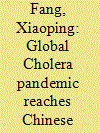

|
|
|
|
|
| Publication |
2014.
|
| Summary/Abstract |
In 1961 the seventh global cholera pandemic, El Tor cholera, broke out in Indonesia. Between 1962 and 1964, El Tor infected the southeast coastal areas of China. This pandemic occurred at a time of significant reorganization for both the rural medical and health systems and the people's communes following the failures of the Great Leap Forward. This paper explores how local governments led rural medical practitioners, health care workers, and villagers to participate in the campaign against the spread of El Tor cholera despite the readjustment and retrenchment of the people's communes as social, administrative, and political units. I argue that, during this period of flux, the local government strengthened its control over rural medical practitioners by institutionalizing their daily work practices and reducing their freedom of movement, whilst simultaneously providing incentives for health care workers to join the vaccination campaign. The people's communes and the household-registration system after 1961 put further restrictions on population mobility. This cellularization of village society greatly facilitated the vaccination, quarantine, and epidemic-reporting processes, and contributed to the formation of an epidemic-prevention system and eventually a response scheme for managing public health emergencies in rural China. This process reflected the complexity of the mutual interactions between the political and medical systems under socialism.
|
|
|
|
|
|
|
|
|
|
|
|
|
|
|
|
| 2 |
ID:
155174
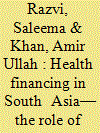

|
|
|
|
|
| Summary/Abstract |
Millions of households are pushed into poverty every year because of high outof-pocket
(OOP) expenditure on health care. Globally, each year more than 150
million people face financial catastrophe and around 100 million suffer destitution
due to OOP payments made for health care. More than 90 per cent of these people
reside in low-income countries. In South Asia, impoverishment due to health
payments is significant with at least 32 million people in India alone being pushed
into poverty annually due to OOP expenditures on health care. In most health care
systems in this region, the role of public spending on health and prepaid schemes,
such as tax and social insurance, is limited as is the extent of financial risk protection.
The problem is compounded by the large informal sector which is a major
challenge to attaining universal health coverage in South Asian countries.
Recent literature points to the role of public–private partnerships (PPP) in
health care as a viable solution for ensuring equitable access to health care especially
for the poor. This article seeks to review the major components of health
care financing and reform including financial risk protection, resource generation
and pooling, and PPPs in procurement and payment in South Asia. It identifies
key lessons across the health financing systems of Asian countries that
have attempted to reduce dependence on OOP expenditures, expanded health
service delivery and increased pooled health financing mechanisms. It analyses
the role and importance of PPPs in mitigating the impoverishing effects of OOP
health expenditure in South Asia.
|
|
|
|
|
|
|
|
|
|
|
|
|
|
|
|
| 3 |
ID:
124510
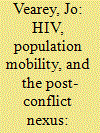

|
|
|
|
|
| Publication |
2013.
|
| Summary/Abstract |
As with many issues associated with the movement of people, linkages between mobility, HIV, conflict and post-conflict settings have often been based on conjecture rather than fact. Conflict was assumed to increase transmission of HIV, and displaced populations, refugees and armed forces were presumed to have higher HIV prevalence than host communities. However, recent evidence challenges these assumptions. This article explores the complex relationship between HIV and post-conflict settings, and considers if and how migrants and mobile populations - including returning refugees - are at increased risk of HIV acquisition in post-conflict settings.
|
|
|
|
|
|
|
|
|
|
|
|
|
|
|
|
| 4 |
ID:
187418
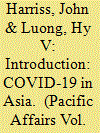

|
|
|
|
|
| Summary/Abstract |
In this introduction to studies of the politics of the COVID-19 pandemic in four Asian states—India, Pakistan, Vietnam, and South Korea—we first discuss the difficulties in evaluating the performances of different countries, given the varying reliability of data and the different possible criteria that may be applied. In our studies we aim rather to illuminate the process of different state responses, and we go on to summarize evidence on different patterns of response across Asia, situating the four country studies in a comparative context. We then review arguments in the literature about the determinants of different responses, before presenting our framework for the analysis of the politics that underlie these differences. Political leadership has undoubtedly exercised a powerful influence, but in the structural context of the relationships of state and citizens. We argue that understanding of these relationships is advanced by an analytical framework that draws on state-in-society approaches developed in the work of Joel Migdal, Michael Mann, and Peter Evans.
|
|
|
|
|
|
|
|
|
|
|
|
|
|
|
|
| 5 |
ID:
124509
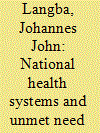

|
|
|
|
|
| Publication |
2013.
|
| Summary/Abstract |
This article examines challenges faced by the national health systems of African countries emerging from conflict in the provision of antiretroviral (ARV) medication and HIV/AIDS-related healthcare. It analyses resource profiles, the unmet need for antiretroviral medication, and progress in the provision of HIV/AIDS-related healthcare in Burundi, Liberia, Mozambique, Rwanda, Sierra Leone and Uganda, using data from the Global AIDS Response Progress Reports (GARPR) of 2011. Findings indicate that challenges to the health systems in post-conflict countries are immense and should not be underestimated, particularly in the context of HIV/AIDS. Policy recommendations for bolstering the performance of national health systems of post-conflict countries in the context of HIV/AIDS are proposed.
|
|
|
|
|
|
|
|
|
|
|
|
|
|
|
|
| 6 |
ID:
124512
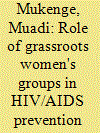

|
|
|
|
|
| Publication |
2013.
|
| Summary/Abstract |
The unique experiences of women and girls in conflict situations have been highlighted in key research over the past two decades,1 warranting the need for a gendered approach in post-conflict reconstruction processes. This article focuses on the emergence of HIV in such settings and highlights the contributions of women's groups to HIV interventions and policy formulation, using case studies from Sierra Leone and the Democratic Republic of the Congo (DRC). The article argues for the need for a much deeper gender analysis in HIV intervention strategies, and concludes with recommendations to ensure access to justice and health services for women.
|
|
|
|
|
|
|
|
|
|
|
|
|
|
|
|
| 7 |
ID:
124513
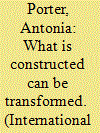

|
|
|
|
|
| Publication |
2013.
|
| Summary/Abstract |
This article explores masculinities in post-conflict contexts in Africa and the need for their transformation. It commences with an examination of the constructs of masculinity and masculinities, and presents perspectives on masculinities in Africa, including possible sources of gender conditioning on the continent. The article then reviews the main roles that men play and the various conditions that confront them during and after violent conflicts in Africa, and examines particular features and challenges that men and their masculinities face in African post-conflict societies. Lastly, the article reviews some practical interventions that aim to transform masculinities in various contexts, and suggests possible avenues towards more effective and sustainable transformation.
|
|
|
|
|
|
|
|
|
|
|
|
|
|
|
|
|
|
|
|
|